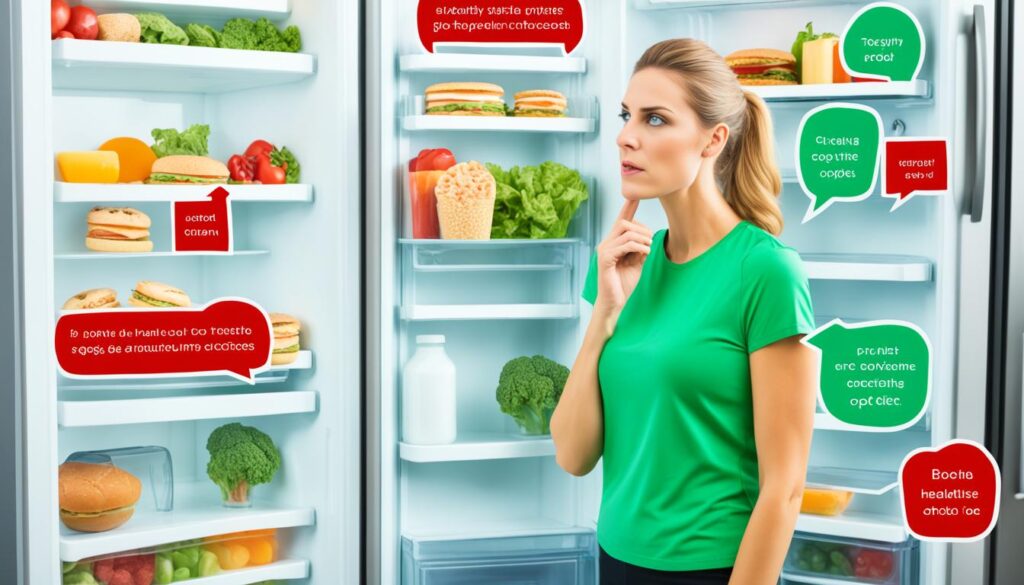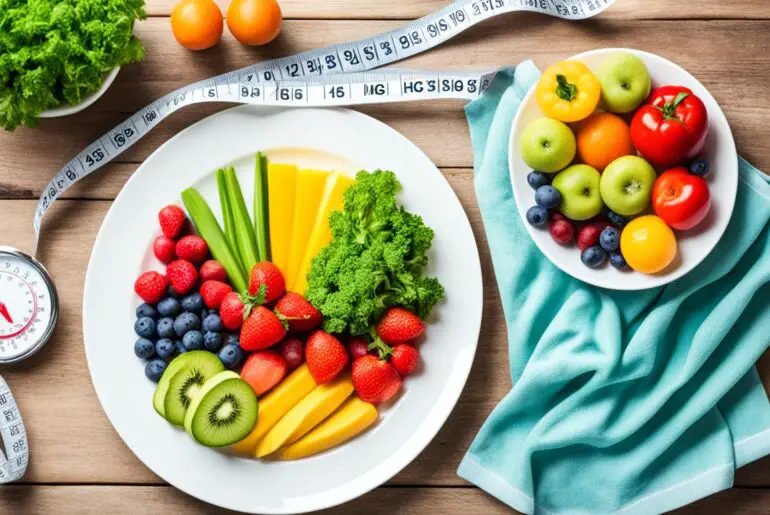Have you ever tried a diet where you have to restrict your calorie intake to just 500 calories a day? It sounds like a recipe for constant hunger, doesn’t it? Well, that’s not the case with the HCG diet. Contrary to common beliefs, the HCG hormone used in this diet has been found to suppress hunger cravings for most individuals. So, how does it work? And what are some effective strategies to manage hunger while on the HCG diet? Let’s explore.
Key Takeaways:
- The HCG hormone used in the HCG diet can suppress hunger cravings.
- Causes of hunger on the HCG diet can include expired or low-quality HCG and not properly loading before starting the diet.
- Managing hunger on the HCG diet involves spacing out meals, staying hydrated, and adding extra vegetables to meals.
- Finding the right dose of HCG is crucial for hunger control on the HCG diet.
- Using real HCG hormone is important for optimal hunger suppression.
Causes of Hunger on the HCG Diet
While the HCG diet is generally known for its hunger-suppressing effects, there are several factors that can contribute to feelings of hunger while following this diet plan. It is important to be aware of these causes and address them to effectively manage hunger and maintain success on the HCG diet.
Expired or Low-Quality HCG
The quality and freshness of the HCG hormone used can greatly impact hunger levels during the HCG diet. Using expired or low-quality HCG may weaken its hunger-suppressing effects, leading to increased hunger cravings. It is crucial to ensure that the HCG product being used is of high quality and has not exceeded its expiration date.
Inadequate Loading Phase
The loading phase of the HCG diet is an essential step to prepare the body for the low-calorie phase. By consuming a higher calorie diet for a few days, the body’s fat stores are replenished, helping to reduce hunger during the subsequent low-calorie phase. Failure to properly load before starting the HCG diet may result in increased hunger cravings.
“Immunity” to HCG
Over time, some individuals may develop a state of “immunity” to the HCG hormone, where the body has adapted and does not respond as effectively to its hunger-suppressing properties. This may lead to an increase in hunger cravings. If you experience persistent hunger despite following the HCG diet protocol correctly, it is advisable to consult with a healthcare professional or HCG diet expert to explore potential solutions.
Inadequate HCG Dosage
Taking the correct dosage of HCG is crucial for hunger control on the HCG diet. If the dose is too low, it may not effectively suppress hunger cravings. It is important to follow the recommended dosage guidelines provided by healthcare professionals or the HCG diet plan documentation. Making adjustments to the dosage, under professional guidance, may be necessary to find the optimal amount for hunger control.
Addressing these causes of hunger on the HCG diet is essential for maintaining a successful and comfortable weight loss journey. By ensuring the use of high-quality HCG, properly loading before starting the diet, monitoring for signs of “immunity,” and taking the correct HCG dosage, individuals can effectively manage hunger and maximize the benefits of the HCG diet.
Tips for Managing Hunger on the HCG Diet

Hunger can be a challenging aspect of the HCG diet, but there are several strategies that can help you stay satiated and beat those hunger cravings. By following these hunger management strategies, you can successfully navigate through the low-calorie phase of the HCG diet:
- Ensure the HCG used is fresh and of high quality: Using real and potent HCG hormone is crucial for hunger control on the HCG diet. Sourcing your HCG from reputable suppliers will help ensure its effectiveness in suppressing hunger.
- Properly load before starting the diet: Loading days, where you consume high-calorie foods for a couple of days before starting the low-calorie phase, can help prevent extreme hunger during the early stages of the diet.
- Space out meals throughout the day: Instead of consuming all your meals in a short period, try spreading them out throughout the day. This can help keep you feeling satisfied and prevent intense hunger.
- Drink plenty of water: Staying hydrated is important for managing hunger. Drinking an adequate amount of water throughout the day can help curb cravings and keep you feeling full.
- Enjoy hot and herbal teas: Sipping on hot teas, especially herbal varieties, can provide a sense of satiety and help curb hunger pangs.
- Have a hot soup: Incorporating a warm and low-calorie soup into your meal plan can be a satisfying way to manage hunger and add variety to your diet.
- Add extra vegetables to meals: Vegetables are low in calories and high in fiber, making them a great choice for adding volume to your meals without adding many calories. They can help keep you feeling full for longer periods.
By implementing these hunger hacks and following these hunger management strategies, you can stay on track with your HCG diet and successfully manage hunger cravings.
Dosing of HCG and Hunger Levels
When it comes to hunger levels on the HCG diet, the dosage of HCG plays a significant role. Finding the right dose is crucial for minimizing hunger cravings and ensuring a successful weight loss journey. Most individuals have found that a dose between 125iu-175iu is the optimal range for hunger control.
Men may require slightly higher doses to effectively manage hunger while on the HCG diet.
It is important to note that the ideal dosage can vary from person to person, so it’s recommended to make small adjustments to the dose, either up or down, based on individual needs and hunger levels. This allows for finding the perfect dose that keeps hunger at bay and promotes adherence to the diet plan.
By fine-tuning the HCG dosage, individuals can better regulate hunger levels, supporting their weight loss goals and overall success on the HCG diet.
Importance of Using Real HCG

When following the HCG diet, it is crucial to use real HCG hormone for optimal hunger control and weight loss results. Homeopathic or hormone-free HCG products simply do not have the same effect and may not effectively suppress hunger cravings. To ensure the potency and effectiveness of the HCG hormone, it is important to source it from reputable suppliers.
Real HCG can be administered through various forms such as injections, drops, or pellets, allowing individuals to choose the method that best suits their preferences and needs. These products are specifically formulated to deliver the HCG hormone in its purest and most effective form, maximizing its hunger-suppressing capabilities.
Using real HCG injections, drops, or pellets are the recommended methods for experiencing the full benefits of the HCG diet.
Real HCG hormone ensures that your body receives the necessary signals to suppress appetite and preserve muscle mass while on the low-calorie diet. By using authentic HCG products, you can effectively manage hunger and cravings, making it easier to adhere to the diet plan and achieve your weight loss goals.
Potential Side Effects and Safety of the HCG Diet
While the HCG diet has gained popularity as a weight loss program, it is crucial to understand the potential risks and side effects associated with it. The safety of the HCG diet has been a subject of concern, with the FDA considering it illegal and dangerous. It is important to prioritize your health and well-being by consulting with a healthcare professional before embarking on any weight loss program, including the HCG diet, to ensure safety and to discuss potential risks.
The side effects of the HCG diet may vary among individuals, but common complaints include headaches, depression, fatigue, and in rare cases, blood clots. These side effects can significantly impact one’s well-being and daily life during the diet program.
Proper medical supervision and guidance are essential to minimize the potential risks associated with the HCG diet. Your healthcare professional can help you understand if the HCG diet is suitable for you, consider any underlying health conditions, and monitor your progress throughout the program.
“The potential side effects of the HCG diet should not be taken lightly. It is crucial to prioritize your safety and well-being. Before starting any weight loss program, consult with your healthcare professional to ensure that it aligns with your individual health needs.”
It is also important to consider alternative weight loss methods that focus on long-term sustainability and overall well-being. While the HCG diet offers the promise of rapid weight loss, it may not provide a sustainable solution. Exploring other options such as balanced meal plans, regular exercise, and support from healthcare professionals or weight loss programs can lead to healthier, long-lasting results.
| Table: Comparison of Potential Side Effects and Safety of the HCG Diet |
|---|
|
In summary, it is important to understand the potential side effects and safety concerns associated with the HCG diet. Consulting with a healthcare professional is essential to ensure that the diet aligns with your individual health needs and to minimize any risks involved. Exploring alternative weight loss methods that prioritize long-term sustainability can lead to healthier and more successful outcomes.
Reasons for Lack of Scientific Evidence on HCG and Hunger Control
Despite the claims made about HCG and hunger control, there is a lack of scientific evidence supporting its effectiveness. Many studies have found that weight loss on the HCG diet is primarily due to the low-calorie intake, rather than the hormone itself. The lack of scientific evidence may be attributed to the controversial nature of the HCG diet and the challenges of conducting controlled studies.
Long-Term Sustainability and Alternative Weight Loss Methods

The HCG diet, with its extreme calorie restriction, is not considered a sustainable long-term weight loss solution. While it may yield quick results, maintaining weight loss over time requires a more balanced approach. It is important to explore alternative weight loss methods that promote gradual and sustainable weight loss.
One effective strategy is to follow a balanced and nutritious meal plan. This involves consuming a variety of nutrient-dense foods, including lean proteins, fruits, vegetables, whole grains, and healthy fats. By prioritizing wholesome foods, you can fuel your body with essential nutrients while keeping calorie intake in check.
Regular exercise is another crucial component of sustainable weight loss. Engaging in physical activity helps burn calories, build lean muscle mass, and boost metabolism. Aim for at least 150 minutes of moderate-intensity aerobic exercise or 75 minutes of vigorous-intensity exercise per week, along with strength training exercises.
Behavior modification techniques can also contribute to long-term weight loss success. This includes adopting healthy habits such as mindful eating, portion control, and stress management. By addressing emotional eating triggers and implementing positive lifestyle changes, you can develop sustainable habits that support your weight loss journey.
Seeking support from healthcare professionals or weight loss programs can provide valuable guidance and accountability. Working with a registered dietitian or a weight loss specialist can help you create a personalized plan, track progress, and receive ongoing support and encouragement.
The key to sustainable weight loss lies in making gradual lifestyle changes that are realistic and maintainable in the long run. By incorporating these alternative methods, you can achieve your weight loss goals while prioritizing your overall health and well-being.
Conclusion
When it comes to the HCG diet, caution and careful planning are key. While the diet promises fast weight loss, it’s vital to approach it with the right strategies to avoid hunger cravings and ensure success. By using genuine HCG products, finding the proper dosage, addressing potential causes of hunger, and adopting healthy eating habits, you can effectively manage your appetite on the HCG diet.
Remember to prioritize your safety and consult with healthcare professionals before starting any weight loss program, including the HCG diet. They can provide valuable guidance and support to help you achieve your weight loss goals while maintaining your overall well-being. By following these hunger management strategies and seeking expert advice, you can increase your chances of a successful HCG diet journey.
It’s important to note that the HCG diet may not be suitable for everyone and may not offer sustainable long-term weight loss. Exploring alternative weight loss methods, such as balanced meal plans, regular exercise, and support from healthcare professionals, can provide a more sustainable approach to achieving and maintaining a healthy weight in the long run.
FAQ
Does the HCG diet suppress hunger cravings?
Yes, the HCG hormone used in the diet has been found to suppress hunger cravings for most individuals.
What are the causes of hunger on the HCG diet?
Hunger on the HCG diet can be caused by factors such as using expired or low-quality HCG, not properly loading before starting the diet, reaching a state of “immunity” to HCG, or not taking a sufficient dose of HCG.
What are some tips for managing hunger on the HCG diet?
Strategies for managing hunger on the HCG diet include ensuring fresh and high-quality HCG, properly loading before starting the diet, spacing out meals, drinking plenty of water, having hot and herbal teas, enjoying a hot soup, and adding extra vegetables to meals.
How does the dosing of HCG affect hunger levels?
Finding the right dose of HCG is important to minimize hunger cravings. Most individuals find that a dose between 125iu-175iu is effective for hunger control, with men potentially needing slightly higher doses.
Why is it important to use real HCG on the HCG diet?
Real HCG hormone is necessary for optimal hunger control on the HCG diet. Homeopathic or hormone-free HCG products do not have the same effect and may not suppress hunger effectively. Real HCG can be obtained through injections, drops, or pellets, and they should be sourced from reputable suppliers.
What are the potential side effects and safety considerations of the HCG diet?
Potential side effects of the HCG diet include headaches, depression, fatigue, and in rare cases, blood clots. It is important to consult with a healthcare professional before starting the HCG diet to ensure safety and discuss potential risks.
Why is there a lack of scientific evidence on HCG and hunger control?
The controversial nature of the HCG diet and challenges with conducting controlled studies have contributed to the lack of scientific evidence on HCG and hunger control. Many studies have found that weight loss on the HCG diet is primarily due to the low-calorie intake, rather than the hormone itself.
Is the HCG diet a sustainable long-term weight loss solution?
The HCG diet, with its extreme calorie restriction, is not considered a sustainable long-term weight loss solution. It is important to explore alternative weight loss methods that promote gradual and sustainable weight loss, such as balanced and nutritious meal plans, regular exercise, behavior modification, and support from healthcare professionals or weight loss programs.
Is the HCG diet safe?
The FDA considers the HCG diet illegal and dangerous. It is important to prioritize safety and consult with a healthcare professional before embarking on any weight loss program, including the HCG diet.




